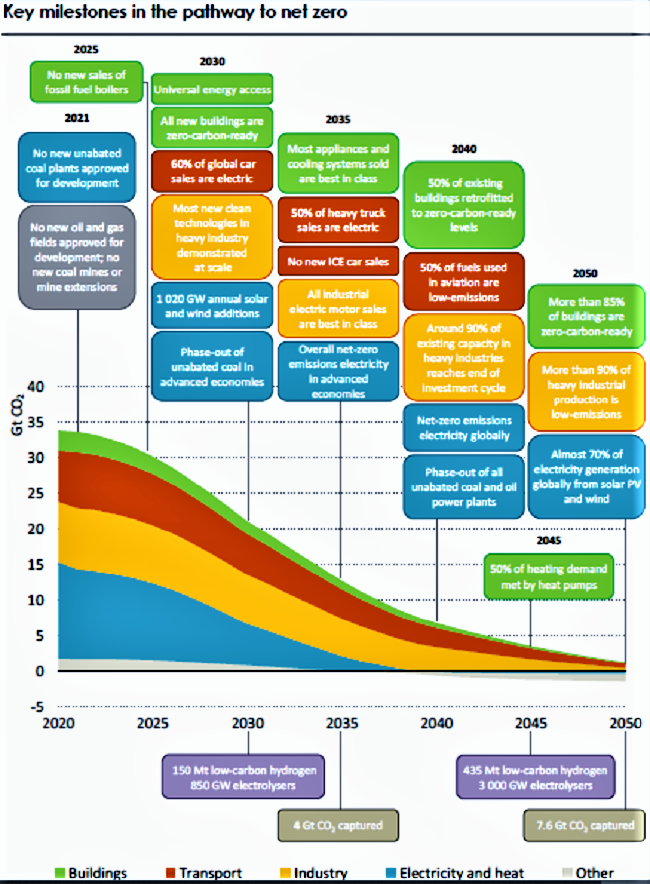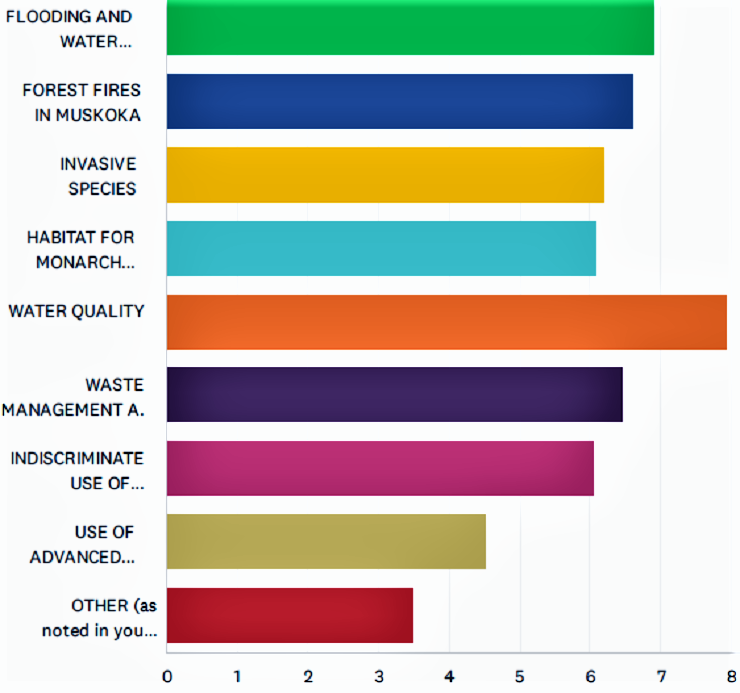PROBUS CLUB SURVEY SEEKS LOCAL SOLUTIONS TO CLIMATE CHANGE IN GRAVENHURST
Mark Clairmont | MuskokaTODAY.com
GRAVENHURST — Bob Barnes is no April’s fool.
A retired petroleum engineer, he admits to being “one of the problems” of climate change — and now he wants to be part of the solution toward ending it.
He says the Ukrainian war is “bringing us face-to-face with the problem of energy consumption, energy needs.”
And the “green transition is a lot quicker than we expected.”
That’s why he likes the federal carbon tax that April 1 added 2 cents to a litre of gas.
“Higher prices is what we need, because we need to stop using gasoline,” he says at the pumps while filling up his Mitsubishi and looking forward with his next ride being an electric vehicle.
So he’s opposed to Doug Ford’s campaign promise to lower the provincial gas tax by 5.7 cents per litre and the fuel tax by 5.3 cents per litre for six months as of July.
The chair of the eight-member Gravenhurst Probus Club’s environmental advisory council says “there’s some seismic changes that need to happen and very rapidly,” before the world overheats.
And the club’s 200+ members are challenging themselves to see how they can contribute to positive change locally.
He says the committee was “established to bring together individuals who wish to better understand the Muskoka environmental issues and to develop recommendations and programs to make this a better community for us all, both now and in the future.”
He says it’s a “necessary and difficult task.”

Barnes said the committee wasn’t sure what those issues were because “you need the support of the community if you’re going to achieve the support of the community.”
But they wanted to focus on “issues Gravenhurst could achieve.”
Last month they summoned the opinions of members and invited the public to participate in a survey “to better understand their priorities on certain environmental issues.”
It’s the first step in learning and then acting on the results.
“We can’t dither about it because the time line is moving on,” says the recent octogenarian who turned 80 March 6 and admits he may not be around to see the full extent of climate change.
But he has four grandchildren whose lives he’s also deeply concerned about.
Barnes said the survey was “configured’ to be as simple as possible to fill out and “achievable” in their intent.
“Goals that could be related to by every person in the town.”
They received 122 responses — 71 per cent among club members and 30 per cent from “town folk.”
He considers it a fairly indicative of a cross-section of older members of the community, many of whom live in Pine Ridge where he does.
With 17 SurveyMonkey questions that “really tells the story very clearly”
Barnes said the results, broken down by Probus member Ken Elsey, were “quite interesting.”
Including basic demographics about respondents, it asked things like: “What was environmentally important to you?”
Which were ranked in importance.
“It told a pretty good story. It identified what was really important to the townfolk in general.”
The leading concern was “water quality” with 114 ranking it No. 1. “A very close second was waste management” with 97.
“Everything seemed to be important, everything that was environmentally challenged was important,” including “indiscriminent use of chemicals.”
Most respondents were women (77-37) and over the age of 70 (73 were 70+, 31 aged 60-70 and only 7 were younger than 40).
Most had some university or post-secondary education, and had 2 in their household and most were Probus members (87-35).
Health care was their No. 1 concern, followed in a tie between the environment and economy.
Among other concerns addressed were air quality, flooding, forest fires, invasive species, saving butterflies and bees.
See the attached page 17 of the survey for a graph that shows the rankings. And below, link to survey.
Next Probus’s environmental group will come up with local suggestions that reflect those “priorities” and come up with “practical” ways to simply and easily let Gravenhurst residents do the small, but important, things on a micro scale to help save the planet.
Like more tree planting, bicycle use, recycling — and less emphasis on consumerism, travel and flying.
He said one question he was “surprised” that didn’t receive a higher ranking was the “incorporation of newer technologies, which would reduce our burning of fossil fuels and enhance energy conservation.”
That may have a relation to the older average age of the respondents, he said.
As an engineer and “technical person myself,” Barnes said “that’s where our real answers have to come from.”
Much of his own study on the evolving problem has been focussed on one of many reports, including a “very, very credible” one entitled ‘Net Zero by 2050: A Roadmap for the Global Energy Sector,’ by the International Energy Agency of the United Nations.
According to that report many of the “huge tasks we have are gong to involve some very serious technology to achieve.”

“It is not biased in any way. They’re telling the real story. This is what has to happen. There’s no question about it.”
With a career behind him as an “international consultant” — for French, Japanese and American companies among others “all over the world” — the retired Toronto cottager-turned Muskokan.
“I’ve always been, like anyone would been, been interested in the environment and the preservation of it. And because of my background in the petroleum and petro chemical business I know the activities of that industry. And much of our problem is rooted in that industry. I understand the roots of the problem. I can understand the transitions that have to happen in that whole industry. The big players of that industry are now transitioning from their roots to becoming more energy-oriented rather than petroleum.”
And while he could see that, in the last 15 years Barnes “could recognize it was becoming a problem.
“That my business was becoming a problem. I know the mindset of the industry and I know what drives it. I’ve been there. So I know the transition that they have to go through. And I know there are some very smart people involved. They will make that transition. They won’t look anything like they look today. I’m sure they’ll be in the energy business, but not in the hydro carbon energy business.”
He said “Energy companies are realizing that the writing is on the wall. That they’re going to sell less oil and gas. And they better start selling something else. They’re moving toward the production of plastic rather than higher carbon fuels.”
Barnes compared it to tobacco’s transition.
So did Barnes have road to Damascus transition that has changed his life now?
“Probably.”
And does he regret his previous professional life?
“I suppose knowing what we know today, I could say ‘yes.’” (It) was not leading us down the right road. But knowing what we knew then was needed. What the world wanted.”
He said “the Ukraine crisis is bringing us face to face with the problem of energy consumption, energy needs. …
“We are in the transition of a green economy and we know that’s where the future lies. It’s just coming a lot quicker than we expected. So there’s going to be a big rush to put that on the front burner to replace the hydro carbons source with a green source.
“In the meantime we have to do some stop-gapping and fill in the shortage with other sources of hydro carbon from elsewhere till we can get the green energy really up.”
But Barnes says we’re only about “15 per cent” of the way there.
Yet “it’s a very local picture, because some countries are very, very advanced,” like in Europe and Scandinavia that are halfway to 2050 targets now.
Canada, he said, is “lagging way behind.”

According to UN’s Net Zero report “It’s going to be painful,” said Barnes, who added “This is going to be an unpopular view, but I welcome high gas prices. Because we need some pain to change our minds. I’m afraid you’re going to have to feel the pain at the gas pump until you change your ways.”
Barnes says that includes himself. He drives a Mitsubishi SUV that takes gas.
But he says his next vehicle will be an EV.
“Not yet, but it’s coming within two years.”
He said unfortunately all of this is still going to “take time to change.”
And at what price?
“That’s why I say the pump price is what we need. And this is why we have a carbon tax and higher pump prices. You have to encourage people, even with pain, to change their ways. And the higher gas prices is a necessary way of saying this is what we have to do. But that is encouraging us to leave the gas pump.”
Transportation, noted Barnes, accounts for a third of global warming.
“It’s a big chunk, it’s not a little piece” that can be controlled by individual drivers.
“Your car is a small piece of a big picture.”
Russia’s war on Ukraine is “going to expedite” global gas reduction goals, because you’re turning the tap off a major pipeline, which is from an environmental point of view is a good thing.”
Barnes said while you can’t now run factories solely on solar power, that is coming.
“There is more energy coming to this globe than it can use.
“There’s energy everywhere you look — not just from the sun and wind but tidal power.
“We’re sitting on, just below our feet, the greatest source of energy anywhere in our molten core.”
Geo-thermal heat pumps allow you to drill down in your own yard and take some heat from the ground.
“It’s warmer than the air, so their heat there for you — and it’s free.”
Another practical solution is bicycle use that is “catered to” in other countries.”
“We just haven’t gotten our head around it. We’re way behind.
“If we’re going to switch, we’ve got to make it easy.”
Barnes said as for the survey “We’re not going to write to the United Nations. We’re going to try to do something to work within Gravenhurst and see what we can do.”
He cited, for example, salt runoff into lakes from municipal and private road spreaders; and fertilizer from golf courses; along with pesticide and herbicide uses.
“There are substitutes for these chemicals, but it take efforts to follow the science” to come up with planet-saving improvements.
“I don’t think there’s a silver bullet yet.”
In the meantime the Probus committee will come up with recommendations for the club to promote within the town — perhaps in monthly steps — to encourage and incentivize more green public behaviours.
Barnes said Canadians have to ante up.
“They have to. We have relatively low taxes compared to countries that are ahead of us environmentally. But they get something for it. We don’t have a choice.
“We’re going to have to live with some higher taxes.”
EMAIL: news@muskokatoday.com
28 years of ‘Local Online Journalism’
Twitter: @muskokatoday, Facebook: mclairmont1
Leave comments at end of story
SUBSCRIBE for $25 by e-transferring to news@muskokatoday.com
Or go online to https://muskokatoday.com/subscriptions

